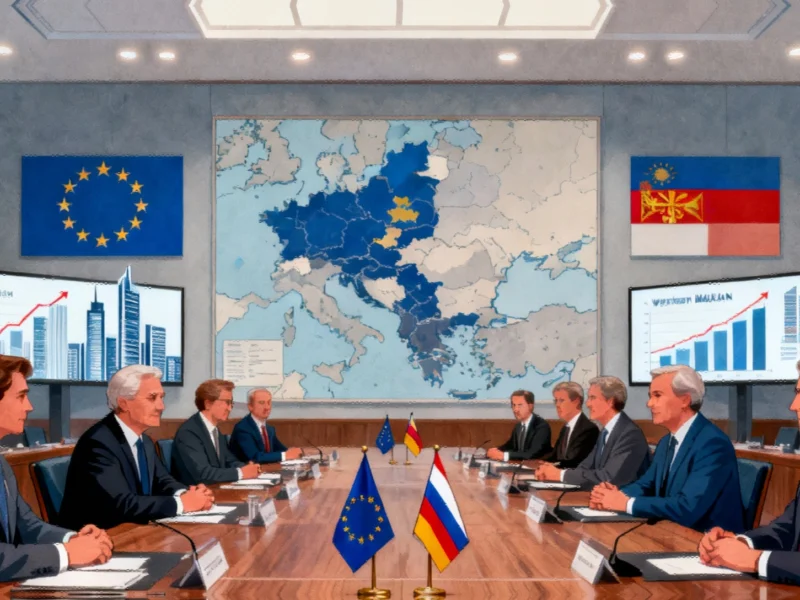The Geopolitical Crossroads
As European leaders prepare for another round of Western Balkans discussions, the region stands at a critical juncture. The European Union faces a strategic imperative: accelerate integration or risk ceding influence to global competitors. While previous enlargement efforts often focused on political promises, the current approach recognizes that economic integration must precede full membership to deliver tangible benefits.
The stakes extend far beyond regional stability. With Russia and China actively expanding their influence through infrastructure investments and diplomatic outreach, the Western Balkans represents a crucial test of European strategic autonomy. The EU’s new €6 billion Growth Plan acknowledges this reality by linking financial support to concrete reforms while offering gradual access to the single market—a significant departure from previous approaches.
Economic Integration as Strategic Priority
The European Commission’s innovative strategy recognizes that traditional enlargement timelines are insufficient for addressing the region’s urgent economic challenges. At current growth rates, Western Balkan countries would need decades to reach EU income averages. The Growth Plan addresses this through a dual approach: substantial funding combined with phased market access that rewards progress.
This represents a fundamental shift from the previous dynamic, where both sides engaged in what Brussels insiders called “mutual pretense.” Now, the focus is on creating measurable benefits through initiatives like the regional common market, which serves as both preparation for EU integration and an immediate economic boost. The success of this approach demonstrates how strategic economic planning can advance geopolitical objectives while delivering concrete improvements to citizens’ lives.
Concrete Progress Through Regional Cooperation
The elimination of roaming charges across the Western Balkans in 2021 marked a turning point in regional cooperation. This seemingly technical achievement demonstrated that coordinated action could produce immediate, visible benefits. The subsequent agreement with Brussels to reduce EU-Balkan data roaming prices further reinforced this progress.
Beyond telecommunications, mutual recognition of diplomas, professional qualifications, and identity documents is gradually dismantling bureaucratic barriers that have long hampered economic development. These achievements reflect broader global investment trends where regional integration creates more attractive conditions for international capital and expertise.
Addressing Structural Challenges
The Western Balkans face significant demographic and structural hurdles that require urgent attention. United Nations projections indicate the region could lose 17% of its population by 2050 due to low birth rates and high emigration. This demographic decline threatens to undermine economic growth and social stability just as the region seeks closer European integration.
Simultaneously, the digital transformation sweeping global markets presents both challenges and opportunities. As seen in other regions undergoing rapid modernization, infrastructure development must keep pace with technological advances to ensure competitive participation in the global economy.
The Technology Dimension
Modern integration efforts increasingly depend on technological infrastructure and digital governance systems. The Western Balkans’ ability to implement EU standards and participate in the single market will require significant upgrades to digital infrastructure and regulatory frameworks.
This technological transformation extends to how regional cooperation is managed and monitored. Recent innovations in digital systems offer promising approaches for creating transparent, efficient frameworks that can support the complex process of economic integration while building trust among stakeholders.
Public Opinion and Political Momentum
The latest Balkan Barometer survey reveals dramatically shifting attitudes, with support for EU membership reaching 64%—the highest level in a decade. This growing pro-European sentiment reflects frustration with the region’s isolation and recognition that integration offers the clearest path to stability and prosperity.
This popular support creates crucial political momentum for leaders pursuing difficult reforms. However, maintaining this momentum requires delivering continued tangible benefits that reinforce the connection between reform efforts and improved living standards.
The Path Forward
The EU’s revised approach to Western Balkans integration represents a pragmatic recognition that previous methods were inadequate for contemporary challenges. By prioritizing economic integration and regional cooperation, the new strategy creates multiple pathways for progress while reducing the risks of political stalemate.
Key elements for success include:
- Early sectoral integration in digital and financial services to build momentum
- Phased access to Schengen travel arrangements to reinforce European identity
- Continued support for regional cooperation initiatives that build institutional capacity
- Balanced approach addressing both economic and political reform requirements
This comprehensive strategy acknowledges that successful integration requires addressing both immediate economic needs and long-term structural challenges. As global competition intensifies, the EU’s ability to demonstrate the tangible benefits of European integration will determine whether the Western Balkans firmly anchor their future with Europe or seek alternatives elsewhere.
The coming years will test whether this new approach can finally deliver on the promise of European integration that has eluded the Western Balkans for decades. The outcome will shape not only the region’s future but Europe’s geopolitical standing in an increasingly competitive world.
This article aggregates information from publicly available sources. All trademarks and copyrights belong to their respective owners.



